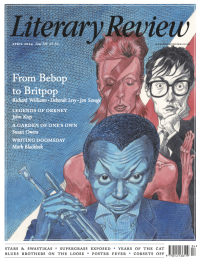Jon Savage
Year the Music Died
Pulp’s This is Hardcore
By Jane Savidge
Bloomsbury 168pp £9.99
Pulp’s album This is Hardcore, released in 1998, unfolds as an onrush of thoughts, words, feelings and scenarios, many of them unsettling, if not actually unpleasant. Dense and long – thirteen songs running to almost an hour and ten minutes – it is a profound reaction to individual crises and more general cultural shifts. It is also perhaps the oddest and most disquieting album ever to make it to the top of the album charts. Perceived at the time as a failure, it was a record that was not necessarily supposed to be enjoyed: as Jarvis Cocker sings on the pre-emptive opener, ‘The Fear’, ‘you’re gonna like it, but not a lot’. At times reminiscent of Scott Walker and Kevin Ayers – romantics and isolates doubling as seducers – Cocker sings in a modified Bowie croon over mainly mid-tempo, often-orchestrated arrangements that evoke the sleazy, kitsch extremities of lounge music. Mood meets intention in a complex series of songs that reward the close attention given to them by Jane Savidge, who draws on her experiences as Pulp’s PR representative during the 1990s.
In autumn 1996, Cocker was in a very strange position. After eighteen years of toiling away with Pulp, the band he started as a Sheffield schoolboy, he had finally achieved mainstream success in 1995 with the breakthrough single ‘Common People’ and a memorable performance at Glastonbury. Within a year or so, Pulp had racked up a further three top ten hits and a number one album, Different Class. Everything changed, however, at the Brit Awards in February 1996 when Cocker rushed onto the stage during a performance by Michael Jackson in a protest against the sanctification of an alleged sexual predator.
Cocker found fame difficult enough, but after the Brits fame shaded into notoriety. The tabloids fixed their harsh light on him, and once they’re involved, everything gets stupid. This was a complete upheaval for a long-time outsider and no-hoper from Sheffield. He later remarked, ‘what I’ve realised is that the

Sign Up to our newsletter
Receive free articles, highlights from the archive, news, details of prizes, and much more.@Lit_Review
Follow Literary Review on Twitter
Twitter Feed
Under its longest-serving editor, Graydon Carter, Vanity Fair was that rare thing – a New York society magazine that published serious journalism.
@PeterPeteryork looks at what Carter got right.
Peter York - Deluxe Editions
Peter York: Deluxe Editions - When the Going Was Good: An Editor’s Adventures During the Last Golden Age of Magazines by Graydon Carter
literaryreview.co.uk
Henry James returned to America in 1904 with three objectives: to see his brother William, to deliver a series of lectures on Balzac, and to gather material for a pair of books about modern America.
Peter Rose follows James out west.
Peter Rose - The Restless Analyst
Peter Rose: The Restless Analyst - Henry James Comes Home: Rediscovering America in the Gilded Age by Peter Brooks...
literaryreview.co.uk
Vladimir Putin served his apprenticeship in the KGB toward the end of the Cold War, a period during which Western societies were infiltrated by so-called 'illegals'.
Piers Brendon examines how the culture of Soviet spycraft shaped his thinking.
Piers Brendon - Tinker, Tailor, Sleeper, Troll
Piers Brendon: Tinker, Tailor, Sleeper, Troll - The Illegals: Russia’s Most Audacious Spies and the Plot to Infiltrate the West by Shaun Walker
literaryreview.co.uk